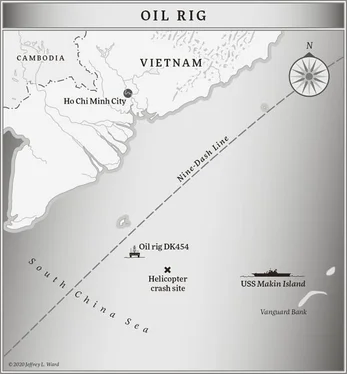Hala shook her head, collar between her teeth.
Ren’s gaze shifted quickly to Zulfira. “And how about you?”
“My sister is dead to me,” Zulfira said.
“That is too bad,” Ren said, before letting his hungry gaze settle back on Hala. “I would very much like to meet your mother. And, with her gone, that leaves you all alone in the world. Does it not, child?”
Hala pressed against her aunt, who put an arm around her shoulder and drew her close.
“She is not alone,” Zulfira said.
Ren stood there in the doorway, black eyes flitting back and forth between Hala and her aunt.
“We will see you both tomorrow evening,” he said, and then shut the door behind him.
Neither moved until they heard the vehicle start and gravel crunch as it pulled away on the street.
Hala felt as if a sudden weight had been lifted off her back. Even at ten years old, she knew all too well how vulnerable they were as Uyghur females. There was no one to call to protect them. The police were simply another arm of the XPCC. Zulfira gasped, swaying on her feet. She clutched the table to keep from collapsing.
“You must be careful of that one, Hala.” Zulfira’s eyes stayed locked on the door, as if she expected the men to burst back in at any moment. “Suo is focused on me, but his stooge, Ren, he is the more dangerous of the two.”
“Why did he want to know about my mother?” Hala asked.
Zulfira gave a little shrug, but said nothing.
Hala pressed the issue, pent-up words gushing out all at once like water from a broken pitcher. “I wish we could call her on the telephone and see that she is all right. Do you know where she is? How we might find her? I miss her so much, sometimes I think—”
Zulfira put a finger to her lips and gave a stern shake of her head, unwilling to broach that subject, even now that the men were gone.
“Why did she leave me?” Hala said, sniffing back the tears.
“She did not share her reasons with me,” Zulfira said. “She simply went away—and she is never coming back.”
“Never?”
“I have told you all I know.”
Zulfira breathed deeply, regaining her composure, then began clearing the table.
Hala picked up her own bowl and the serving spoon for the rice pudding, studiously avoiding the utensils the men had used. “They are coming back tomorrow night …” She didn’t know whether to cry or scream. “What will we do?”
Zulfira stopped halfway between the table and the sink, turning to face Hala, brandishing a fork to drive home her point. “You will become very, very small,” she said. “Invisible, like a mouse. And I … I will do whatever I must to keep you safe. Now,” she said, turning again toward the kitchen counter. She swayed for a moment, then grabbed at the table to steady herself.
Hala went to help her. “Are you all right?”
Zulfira gave a hollow cough, then heaved, like she might vomit. “I am fine,” she whispered. “Go to bed.”
Hala reached to comfort her, the way her mother had done for her. “I can see to the dish—”
“Go to bed!” Zulfira snapped. “I mean it. And do not speak of your mother again. The stupid woman will get us both killed … or worse.”
15
Medina Tohti was trained as an engineer, not a killer, but single-minded patience made her exceptional at both.
In China, it was not enough to want to be somewhere. One had to show a need to be in a particular place at a particular time. What’s more, that need had to agree with the government’s assessment. Vacations to National Forest Parks were a necessity, important to demonstrate to the rest of the world—and most especially the West—that China was a worthy tourist destination, and its citizens were happy and content in their heavenly land.
Fortunately for Medina Tohti, the government believed Ma Jianyu, the man behind the wheel, needed to be driving the dirty white Ministry of Culture and Tourism van toward Urumqi at this moment.
Dusty headlights worked overtime to cut the inky darkness of the road ahead. Wild double-humped Bactrian camels, or the odd feral goat, sometimes wandered out into the road, causing Ma to swerve violently. A goat would damage the van and raise unwanted questions from the Bingtuan state security forces, but the van would have struck a camel in the legs, sending the big animal through the windshield. Even if Ma Jianyu and the two Uyghur passengers survived, they would have a difficult time explaining the secret compartment and weapons in the back of the van. So Medina and the young Uyghur man named Perhat gazed ahead into the hypnotic blackness as if their life depended on it.
Ma, whom they called Mamut, spoke as he drove, teaching, but more like a religious leader than a college professor. Medina and Perhat listened intently, eyes forward, watching for camels and other signs of danger.
They all saw it at once, the flashing lights of a Bingtuan police checkpoint about the time the faint glow of Urumqi, the capital of the Xinjiang Uyghur Autonomous Area, hove into view on the horizon.
Ma whistled sharply, warning his two passengers. He needn’t have. Medina and Perhat were already sliding the boxes in the back of the van to one side, so they could lie down in the hollow area beneath the false floor, what they called “the can.”
The government did not recognize Medina’s need to be anywhere. She was a fugitive in a part of the world where the Chinese Communist Party surveilled all its citizens. Throughout most of the People’s Republic of China, Beijing’s Social Credit System used a network of software crawlers, voice exemplars, security cameras, and facial-recognition programs to document the most mundane behaviors of daily life, from social media content, to shopping preferences, to how quickly one paid their bills, all in order to assign a numerical score. Much like a credit score in the West, something in the seven hundreds allowed a Chinese citizen to rent a car, book a hotel, or travel on a train, generally without leaving a deposit. The Social Credit System’s avowed goal was to allow honest Chinese citizens to travel freely around the world, but to keep dishonest people “from taking a single step” without being noticed.
In Xinjiang, the frontier province in far-western China, the system was made even simpler—and more onerous. Instead of a numerical score, there were three classifications. Ethnic Han Chinese and a chosen few Uyghur and Hui peoples who had jumped into the government wagon were deemed Trustworthy . Uyghurs despised these minority turncoats, and often referred to them as watermelons—Muslim green on the outside but Communist Chinese red on the inside. Uyghur, Hui, Kazakhs, and other minorities were generally classified with a score of Average . Anyone in the Average category who had broken one of Beijing’s rules, or had a close relative who had broken one of the rules, was given the social classification of Untrustworthy , and, more often than not, carted off to be reeducated at one of the internment camps that dotted western China. The offenses were many: worshiping outside a mosque, teaching a child Uyghur history, burying a newborn’s umbilical cord, or simply having WhatsApp or Twitter or a long list of other evil applications installed on one’s mobile phone.
Medina Tohti tried to stretch out as best she could in the cramped compartment. Pistol in hand, she slowed her breath as the van rolled toward the Bingtuan roadblock. If the XPCC militia soldiers decided to search the van, there was no doubt they would find the hiding spot. All three had agreed they would not be taken alive, vowing to take as many of these militia soldiers with them as they could before they were gunned down. Hopefully it would not come to that. Medina had cried too many tears and cursed too many curses to feel anything close to terror as the van came to a squealing stop. She’d hoped to see her daughter again one day, but had given up on even that. It was a liberating thing being numb to the idea of death—or life, for that matter.
Читать дальше











![Александр Ирвин - Tom Clancy’s The Division 2. Фальшивый рассвет [litres]](/books/417744/aleksandr-irvin-tom-clancy-s-the-division-2-falsh-thumb.webp)
